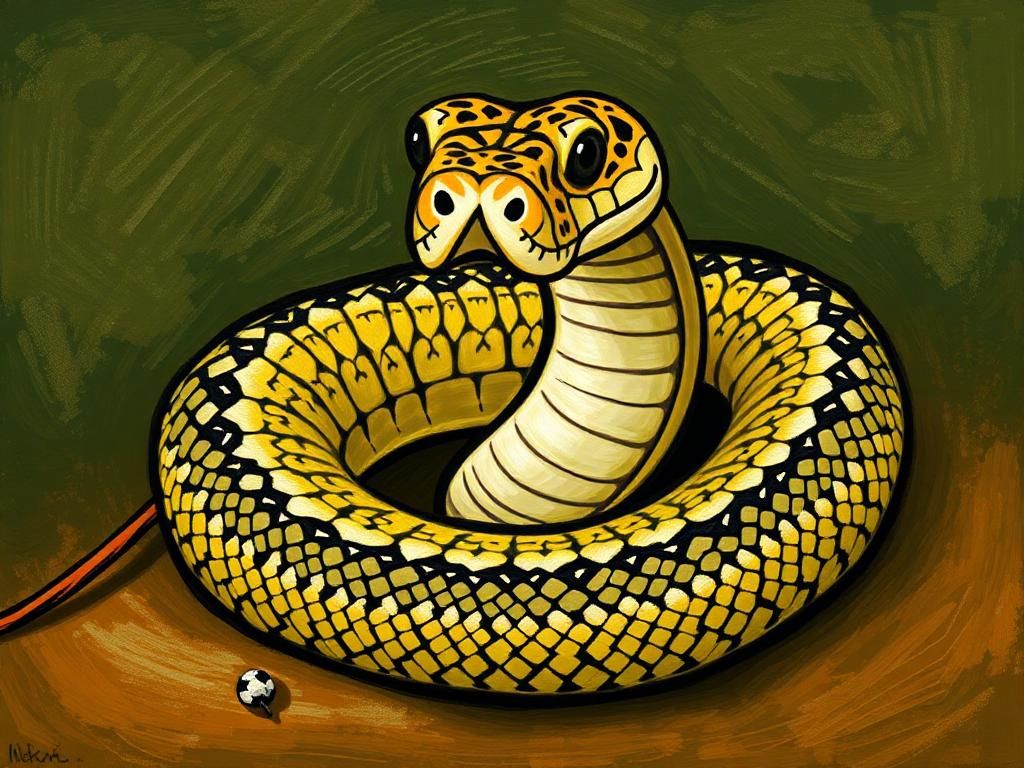The meaning of the snake resonates deeply across various cultures and ideologies, symbolizing everything from wisdom to deception. Understanding these diverse interpretations is essential not only for those who are curious about cultural symbols but also for deeper personal introspection. The snake, as an ancient symbol, embodies a richness of meanings that reflect human fears, aspirations, and spiritual beliefs.
Historical Context of Snake Symbolism
Snakes in Ancient Civilizations
In ancient Egypt, the snake was a prominent symbol associated with deities, particularly the goddess Wadjet, who represented protection and the Pharaoh’s sovereignty. Egyptian royalty often adorned themselves with snake motifs, embodying power and authority. The snake’s ability to shed its skin also linked it to rebirth and transformation, themes prevalent in various mythologies.
In ancient Greece, snakes appear prominently in mythology, notably through Asclepius, the god of healing, who was often depicted with a staff entwined with a snake. This symbol signifies healing and regeneration. The Ouroboros, depicting a snake eating its own tail, conveys ideas of eternity, transformation, and the cyclical nature of life and death, emphasizing the duality inherent in the meaning of the snake.
Snakes in Religious Texts
The Judeo-Christian tradition often portrays the snake negatively, particularly in the story of the Garden of Eden, where the serpent tempts Eve, leading to humanity’s fall. This interpretation represents temptation, sin, and betrayal, establishing deep-seated fears surrounding snakes in Western thought.
Contrastingly, Hinduism regards the Nāga, a sacred serpent, as a protective entity symbolizing water and life. Often depicted in religious art, Nāgas represent the connection of the spiritual with the terrestrial, demonstrating the multifaceted meaning of the snake in Eastern spirituality.
Cultural Interpretations of Snakes
Western Perspectives
The typical Western interpretation of snakes often carries heavy negative connotations, such as deceit and betrayal. This viewpoint is commonly reinforced through popular culture, where snakes symbolize fear and horror in films and literature. For instance, characters with serpentine features may be portrayed as villains, emphasizing cultural anxieties surrounding these creatures.
Eastern Perspectives
In contrast, Eastern cultures celebrate the meaning of the snake in vastly different lights. In Chinese culture, for example, snakes symbolize wisdom and longevity, connected to the elemental cycles of nature. Similarly, in Indian mythology, snakes often appear as protectors, embodying both divine and earthly powers, signifying the duality between good and evil.
Psychological and Spiritual Meanings

Snake as a Symbol of Change
The ability of snakes to shed their skin profoundly symbolizes transformation and rebirth. This natural process highlights personal growth, suggesting the need to shed old habits and embrace new beginnings. Those who resonate with the meaning of the snake may find parallels in their own journeys of self-discovery and change.
Duality of Meaning
The snake embodies both destruction and healing, serving as an enemy in some contexts and an ally in others. This duality extends to the caduceus, a symbol of medicine, illustrating how the meaning of the snake balances the opposing forces of masculine and feminine energies, encapsulating the complexities of life.
Contemporary Relevance of Snake Symbolism
Snakes in Modern Art and Literature
In contemporary storytelling, snakes frequently represent the ultimate duality of character—hero versus villain. Authors and artists leverage the symbolism of the snake to convey internal struggles and moral complexities. Its depiction in visual arts often reflects themes of temptation or wisdom, resonating well with modern audiences exploring their own identities.
The Rise of Snake Culture
The recent popularity of snakes as pets has fostered appreciation for these misunderstood creatures. Many people are now exploring the meaning of the snake through ownership and care, finding connections with their own life paths. Moreover, snake tattoos have become a popular form of personal expression, symbolizing an array of meanings from fertility to transformation, showcasing the evolving perceptions of snakes in society.
Personal Reflections and Interpretations
Personal Symbolism of Snakes
To many individuals, the meaning of the snake resonates on a personal level. Individuals may reflect on their life experiences that mirror snake motifs—the cycles of change, moments of treachery, or insights gained through personal struggles. By examining their personal symbolism, they can derive strength and understanding from their connections to this profound creature.
Reflection Questions for Readers

– What does the snake symbolize to you personally?
– How do your cultural background and beliefs shape your interpretation of the serpent’s meaning?
– In what ways have you experienced transformation akin to a snake shedding its skin?
– Can you recall instances in your life where the duality of the snake as both ally and enemy played a role?
– How might you use the symbolism of the snake to inform your personal growth?
Summary of Snake Symbolism
The table below summarizes the key points related to the meaning of the snake across different cultures and interpretations:
| Cultural Context | Symbolic Meaning | Examples |
|---|---|---|
| Ancient Egypt | Protection, royalty | Wadjet, Pharaoh’s adornments |
| Ancient Greece | Healing, transformation | Asclepius, Ouroboros |
| Judeo-Christian | Temptation, betrayal | Garden of Eden |
| Hinduism | Protection, life source | Nāga, sacred serpents |
| Chinese Culture | Wisdom, longevity | Chinese Zodiac |
| Modern Interpretations | Duality, personal growth | Art, literature, tattoos |
In various threads of history, spirituality, and culture, the multifaceted meaning of the snake reveals layers of significance that continue to resonate today. By exploring these interpretations, individuals can better understand the complex relationship between humanity and this ancient symbol, opening pathways for personal reflection and connection.
Frequently Asked Questions
1. What is the primary meaning of the snake in different cultures?
The meaning of the snake varies by culture, often symbolizing protection, transformation, and duality in different contexts.
2. Why is the snake associated with healing?
In ancient Greece, the snake was associated with Asclepius, the god of healing, and symbolized regeneration, thus linking it to health and recovery.
3. How do personal experiences shape the symbolism of snakes for individuals?
Personal experiences often parallel the snake’s themes of change and transformation, allowing individuals to relate deeply to its symbolism.
4. What cultural perspectives alter the perception of snakes?
Western cultures typically view snakes negatively, while Eastern cultures often celebrate them as symbols of wisdom and protection.
5. How can snakes represent personal growth?
The act of shedding skin symbolizes letting go of old habits and embracing new paths, embodying the essence of personal transformation.
6. Are there modern interpretations of snake symbolism in art?
Yes, snakes frequently appear in modern art and literature, symbolizing complex themes such as duality and moral ambiguity.
7. What does a snake tattoo typically symbolize?
Snake tattoos can symbolize various meanings, including transformation, fertility, and protection, based on personal and cultural contexts.
8. Why are snakes gaining popularity as pets?
Their appeal as pets fosters appreciation and a deeper understanding of their symbolism, challenging preconceived notions and fears about these creatures.
9. How do snakes connect to psychological themes?
Snakes symbolize deep psychological themes of fear, change, and duality, serving as metaphors for personal challenges and growth.
10. How can reflecting on the meaning of snakes assist in personal development?
Engaging with snake symbolism can encourage individuals to confront their fears, embrace change, and explore their personal narratives of growth.
